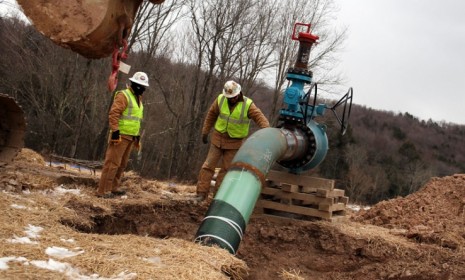Can natural gas drive the U.S. economy?
New drilling technologies like fracking could turn the U.S. into the Middle East of natural gas, fueling economic growth for years to come

A free daily email with the biggest news stories of the day – and the best features from TheWeek.com
You are now subscribed
Your newsletter sign-up was successful
In a few short years, the U.S. has become a major player in the field of natural gas, the cleaner energy alternative to oil and coal. Thanks to hydraulic fracturing, or fracking — a controversial drilling technique that extracts natural gas from shale rock — the U.S. has a surplus of the resource. As a result, natural gas in the U.S. has gotten cheaper and cheaper, plunging to $2 per 1,000 cubic feet for the first time in a decade. When you consider that the same quantity costs more than $9 cost in Europe and nearly $16 in Asia, it's clear we have an eminently exportable commodity that could give the sluggish U.S. economy a serious boost. Could natural gas become a driving force for the economy?
Natural gas is the best way forward: The U.S. is badly in need of a "new industry that will create wealth and jobs," says Jason Trennert at Forbes. The most obvious route would be "to take advantage of the vast natural resources with which America has been blessed." The U.S. currently has 22 billion barrels in proven reserves of natural gas, but that could rise to a heady 400 billion with the use of fracking and other technologies. A "vibrant" natural gas export industry would solve many of the country's problems: It would also "employ a lot of people, and help to restore the middle class."
"NatGas exports best best to bring America back"
The Week
Escape your echo chamber. Get the facts behind the news, plus analysis from multiple perspectives.

Sign up for The Week's Free Newsletters
From our morning news briefing to a weekly Good News Newsletter, get the best of The Week delivered directly to your inbox.
From our morning news briefing to a weekly Good News Newsletter, get the best of The Week delivered directly to your inbox.
It won't solve all of America's economic problems: Natural gas has "clear" benefits for the economy, but it's not a magic wand, says Gregory Meyer at Britain's Financial Times. Even best-case-scenarios can't change the fact that natural gas will likely represent just a small portion of the U.S.'s gigantic, $15 trillion economy. And it's folly to hitch a country's hopes to a speculative market like energy, in which prices fluctuate all the time. "Gas has always been an explosive commodity. Handle predictions of a calm future with care."
"Shale gas unlikely to reignite U.S. economy"
The energy future doesn't belong to fossil fuels at all: "Somewhere in a garage in America or in a basement in China, some teenager is working on a low-cost solar cell and battery that will make her a billionaire and reduce the cost of energy for everyone," says Steven Cohen at The Huffington Post. When that happens, energy companies "will either get with the program, or get wiped out." In addition to being environmentally damaging, natural gas and other fossil fuels will never be anything more than a short-term solution to a longer-term problem of finding a sustainable energy source for the entire planet.
A free daily email with the biggest news stories of the day – and the best features from TheWeek.com
-
 How the FCC’s ‘equal time’ rule works
How the FCC’s ‘equal time’ rule worksIn the Spotlight The law is at the heart of the Colbert-CBS conflict
-
 What is the endgame in the DHS shutdown?
What is the endgame in the DHS shutdown?Today’s Big Question Democrats want to rein in ICE’s immigration crackdown
-
 ‘Poor time management isn’t just an inconvenience’
‘Poor time management isn’t just an inconvenience’Instant Opinion Opinion, comment and editorials of the day